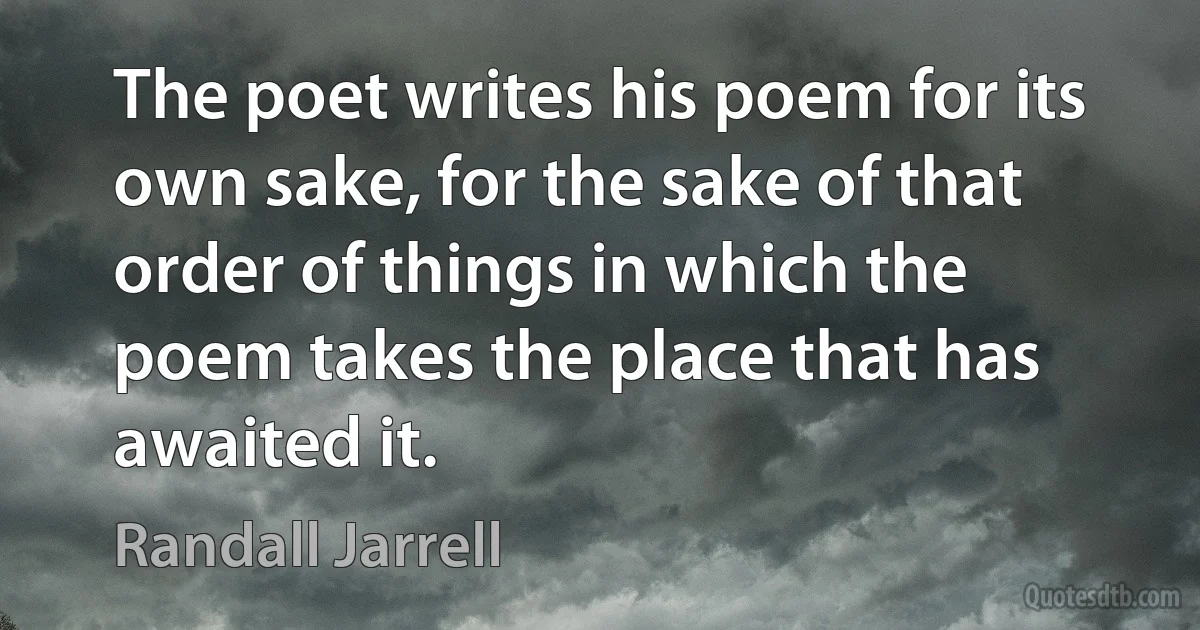Poet Quotes - page 48
When I was asked to talk about the Obscurity of the Modern Poet I was delighted, for I have suffered from this obscurity all my life. But then I realized that I was being asked to talk not about the fact that people don't read poetry, but about the fact that most of them wouldn't understand it if they did: about the difficulty, not the neglect, of contemporary poetry.

Randall Jarrell
If my tone is mocking, the tone of someone accustomed to helplessness, this is natural: the poet is a condemned man for whom the State will not even buy breakfast - and as someone said, "If you're going to hang me, you mustn't expect to be able to intimidate me into sparing your feelings during the execution.”.

Randall Jarrell
Poetry is a bad medium for philosophy. Everything in the philosophical poem has to satisfy irreconcilable requirements: for instance, the last demand that we should make of philosophy (that it be interesting) is the first we make of a poem; the philosophical poet has an elevated and methodical, but forlorn and absurd air as he works away at his flying tank, his sewing-machine that also plays the piano.

Randall Jarrell
Each bud flowers but once and each flower has but its minute of perfect beauty; so, in the garden of the soul each feeling has, as it were, its flowering instant, its one and only moment of expansive grace and radiant kingship. Each star passes but once in the night through the meridian over our heads and shines there but an instant; so, in the heaven of the mind each thought touches its zenith but once, and in that moment all its brilliancy and all its greatness culminate. Artist, poet, or thinker, if you want to fix and immortalize your ideas or your feelings, seize them at this precise and fleeting moment, for it is their highest point. Before it, you have but vague outlines or dim presentiments of them. After it you will have only weakened reminiscence or powerless regret; that moment is the moment of your ideal.

Henri-Frédéric Amiel
Men who are never flagrantly dishonest are at times unveracious in small matters, colouring or suppressing facts with a conscious purpose; and writers who never stole an idea nor pretended to honours for which they had not striven, may be found lapsing into small insincerities, speaking a language which is not theirs, uttering opinions which they expect to gain applause rather than the opinions really believed by them. But if few men are perfectly and persistently sincere, Sincerity is nevertheless the only enduring strength.
The principle is universal, stretching from the highest purposes of Literature down to its smallest details. It underlies the labour of the philosopher, the investigator, the moralist, the poet, the novelist, the critic, the historian, and the compiler. It is visible in the publication of opinions, in the structure of sentences, and in the fidelity of citations.

George Henry Lewes
Poetry - No definition of poetry is adequate unless it be poetry itself. The most accurate analysis by the rarest wisdom is yet insufficient, and the poet will instantly prove it false by setting aside its requisitions. It is indeed all that we do not know. The poet does not need to see how meadows are something else than earth, grass, and water, but how they are thus much. He does not need discover that potato blows are as beautiful as violets, as the farmer thinks, but only how good potato blows are. The poem is drawn out from under the feet of the poet, his whole weight has rested on this ground. It has a logic more severe than the logician's. You might as well think to go in pursuit of the rainbow, and embrace it on the next hill, as to embrace the whole of poetry even in thought.

Henry David Thoreau
To some extent, mythology is only the most ancient history and biography. So far from being false or fabulous in the common sense, it contains only enduring and essential truth, the I and you, the here and there, the now and then, being omitted. Either time or rare wisdom writes it. Before printing was discovered, a century was equal to a thousand years. The poet is he who can write some pure mythology to-day without the aid of posterity.

Henry David Thoreau
When a poet is being a poet - that is, when he is writing or thinking about writing - he cannot be concerned with anything but the making of a poem. If the poem is to turn out well, the poet cannot have thought of whether it will be saleable, or of what its effect on the world should be; he cannot think of whether it will bring him honor, or advance a cause, or comfort someone in sorrow. All such considerations, whether silly or generous, would be merely intrusive; for, psychologically speaking, the end of writing is the poem itself.

Richard Wilbur
A Puerto Rican writer from New York is doubly dislocated: first, there is dislocation from Puerto Rico; secondly, there is Puerto Rico's dislocation from itself. Puerto Rico is a colony of the United States. It may be a truism that you can't go home again, but it's especially true when home is an occupied territory. A Puerto Rican writer from New York, like myself, is twice alienated. I never forget that in this country I belong to a marginalized, silenced, even despised community; yet, in Puerto Rico, as a "Nuyorican” poet, I am marginalized again, for reasons related and unrelated to the island's colonial status...

Martín Espada
...There is no such a thing as an old poet. People are younger and older, chronologically, because of math of calendars, but spirits are young and old simultaneously. Poetry as a professional, life-long pursuit is one that offers wisdom with age, and that's to be respected...

Jesús Papoleto Meléndez
It may be dismissed, on the one hand, as a commonplace aesthetic satisfaction: and, on the other hand, if we say that the idea of God is merely a poetic idea, even if the supreme poetic idea, and that our notions of heaven and hell are merely poetry not so called, even if poetry that involves us vitally, the feeling of deliverance, of a release, of a perfection touched, of a vocation so that all men may know the truth and that the truth may set them free - if we say these things and if we are able to see the poet who achieved God and placed Him in His seat in heaven in all His glory, the poet himself, still in the ecstasy of the poem that completely accomplished its purpose, would have seemed, whether young or old, whether in rags or ceremonial robe, a man who needed what he had created, uttering the hymns of joy that followed his creation. This may be a gross exaggeration of a very simple matter. But perhaps the same is true of many of the more prodigious things of life and death.

Wallace Stevens
Originality and initiative are what I ask for my country. For myself the originality need be no more than the freshness of a poem run in the way I have described: from delight to wisdom. The figure is the same as for love. Like a piece of ice on a hot stove the poem must ride on its own melting. A poem may be worked over once it is in being, but may not be worried into being. Its most precious quality will remain its having run itself and carried away the poet with it. Read it a hundred times: it will forever keep its freshness as a petal keeps its fragrance. It can never lose its sense of a meaning that once unfolded by surprise as it went.

Robert Frost
And therefore, so far as we are concerned, the followers of Pythagoras, who abstain from all things that contain life may do as they please; only observe the different reason for abstaining from things that have life on the part of the Pythagoreans and our ascetics. For the former abstain on account of the fable about the transmigration of souls, as the poet says:-"And some one, lifting up his beloved son,Will slay him after prayer; O how foolish he!”We, however, when we do abstain, do so because "we keep under our body, and bring it into subjection,” (Cf. I Co. ix. 27) and desire "to mortify our members that are upon the earth, fornication, uncleanness, inordinate affection, evil concupiscence;” (Cf. Col. iii. 5) and we use every effort to "mortify the deeds of the flesh.” (Cf. Rom viii. 13)

Origen
Strategy is the craft of the warrior. Commanders must enact the craft, and troopers should know this Way. There is no warrior in the world today who really understands the Way of strategy.
There are various Ways. There is the Way of salvation by the law of Buddha, the Way of Confucius governing the Way of learning, the Way of healing as a doctor, as a poet teaching the Way of Waka, tea, archery, and many arts and skills. Each man practices as he feels inclined.

Miyamoto Musashi
My Zen master, because I've studied Zen for a long time, told me that every one (and all the stories weren't written then) of the Mary Poppins stories is in essence a Zen story. And someone else, who is a bit of a Don Juan, told me that every one of the stories is a moment of tremendous sexual passion, because it begins with such tension and then it is reconciled and resolved in a way that is gloriously sensual. ... A great friend of mine at the beginning of our friendship (he was himself a poet) said to me very defiantly, "I have to tell you that I loathe children's books.” And I said to him, "Well, won't you just read this just for my sake?” And he said grumpily, "Oh, very well, send it to me.” I did, and I got a letter back saying: "Why didn't you tell me? Mary Poppins with her cool green core of sex has me enthralled forever.”.

P. L. Travers
For those who have dwelt in depression's dark wood, and known its inexplicable agony, their return from the abyss is not unlike the ascent of the poet, trudging upward and upward out of hell's black depths and at last emerging into what he saw as "the shining world.” There, whoever has been restored to health has almost always been restored to the capacity for serenity and joy, and this may be indemnity enough for having endured the despair beyond despair.

William Styron
He could not be captured,
He could not be bought,
His running was rhythm,
His standing was thought;
With one eye on sorrow
And one eye on mirth,
He galloped in heaven
And gambolled on earth. And only the poet
With wings to his brain
Can mount him and ride him
Without any rein,
The stallion of heaven,
The steed of the skies,
The horse of the singer
Who sings as he flies.

Eleanor Farjeon
All my life, all I wanted to be was a professional poet. To me being a professional poet was better than notching up a hat trick at Old Trafford.....You get to wear fine clothes and perfume and nobody pulls you up on it. You get out of bed late in the day and nobody calls you a lazy bastard. A state of reverie and the virtue of idleness are paramount. Any poet will tell you this.

John Cooper Clarke



